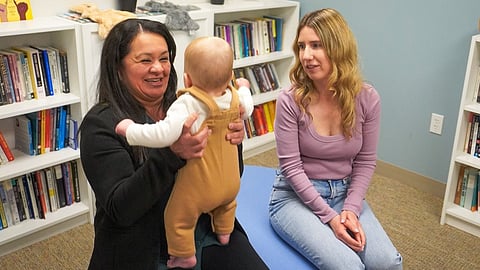
- Home
- NewsGram USA
- India
- न्यूजग्राम
- World
- Politics
- Opinion
- Entertainment
- On Ground
- Culture
- Lifestyle
- Economy
- Sports
- Sp. Coverage
- Misc.
- NewsGram Exclusive
- Jobs / Internships
- Interview

Moms Helping Moms: About one in five U.S. women experience perinatal mental health disorders —including depression and anxiety that can begin during pregnancy and last a year after a child is born.
Stigma prevents many from seeking help. When they do, trained clinicians are hard to find, wait lists are long and the expense is often prohibitive. Due in part to language and cultural barriers, new Latina moms are at more than twice the risk.
A unique University of Colorado Boulder program seeks to fill the gap by matching women who have been through it and come out the other side with those in the thick of it.
“My vision is that every mom who is feeling anxious, stressed and overwhelmed knows that she’s not alone and has access to the support she needs,” said program founder Sona Dimidjian, a professor in the Department of Psychology and Neuroscience at CU Boulder.
Dimidjian launched the program in 2016, inspired by research showing that when depressed patients saw “lay counselors” — specially trained community members with no formal mental health education — for three months, they had fewer symptoms and missed less work. Sixty-four percent experienced remission from depression.
“There are not enough licensed mental health providers to meet the need,” said Dimidjian, who sees peer support as a critical tool for addressing a national shortage.
Alma has partnered with community organizations across Colorado, and in New Jersey and California to provide peer support to about 800 moms so far.
Peer mentors receive 80 hours of training based on a practice called “behavioral activation,” which hinges on the notion that changing what you do can change how you feel. Peers meet with moms in person or remotely six to 10 times, helping them to: identify what makes them feel good; pinpoint what’s keeping them from it; learn to ask for help; and intentionally build those activities — like a walk or a hot shower— into their day.
“Sometimes when we’re feeling depressed, we stop doing the things we used to enjoy, and we start doing things that end up maintaining that depression. Alma empowers moms to break the cycle,” said Anahi Collado, an assistant research professor who trains peer mentors for Alma.
A survey of 126 Spanish-speaking Alma participants found that within two meetings, moms saw their depression decline significantly. Half reported reductions in anxiety and more than a third felt less stressed.
When researchers surveyed 674 new and expectant Latina moms nationwide about the idea of peer-led mental health support, more than 89% said that, compared with working with a mental health professional, working with a peer would make them feel less isolated and more understood.
Peer mentors are not meant to replace licensed clinicians and, in fact, often refer moms to licensed professionals if they have more serious mental health problems.
“Alma is not therapy,” Collado said. “But it can be a critical bridge to other mental health care that a mom might need and wouldn’t otherwise get.” Newswise/SP
